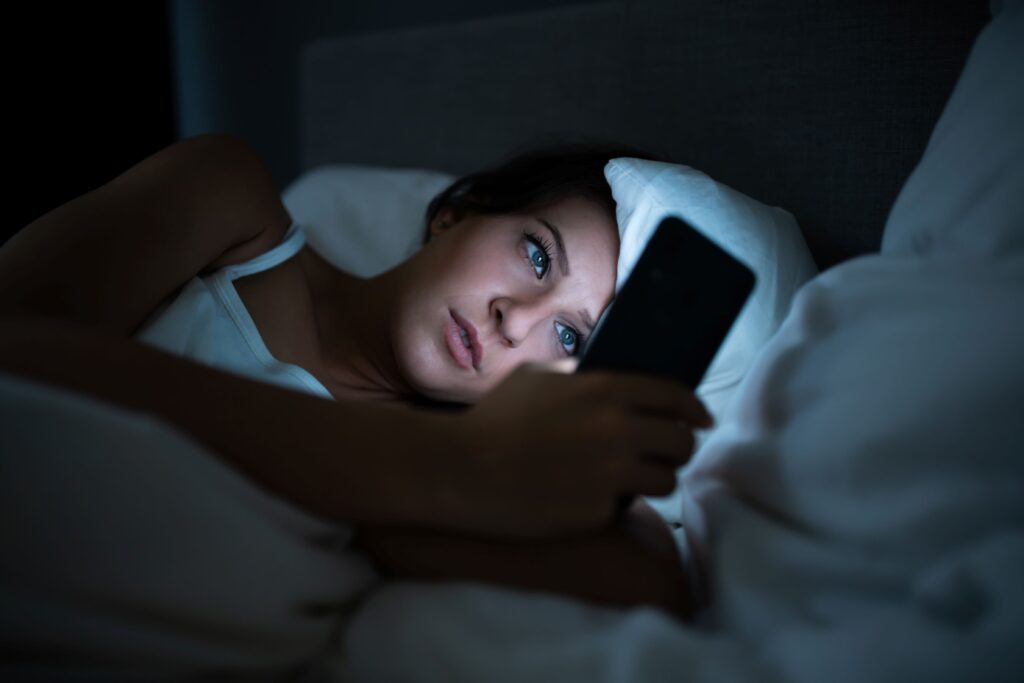
Have you noticed that you wake up feeling more tired or frustrated than when you fell went to bed the night before, or are you increasingly moody and exhausted during the day? If so, you may be suffering from sleep apnea. This disorder repeatedly stops your breathing at night, interrupting the various sleep cycle stages necessary to support your physical and emotional well-being.
Unfortunately, if you also tend to spend time on your smartphone before bed, then you could exacerbate your condition. Continue reading to learn more about how cell phone usage impacts your circadian rhythm so you can get a good night’s rest!
What Is the Natural Sleep Cycle?
Did you know that the average person experiences an estimated four to six sleep cycles per night? A single cycle consists of four stages, each associated with different physical, mental, and emotional benefits.
A normal sleep cycle includes three stages of non-rapid eye movement (NREM) and 1 of rapid eye movement (REM), which are all necessary to perform different functions. For instance, in the earlier stages your muscles begin relaxing, and your breathing, heartbeat, and brainwaves start to slow. During this time, your system repairs tissues and promotes new cell regeneration to strengthen your immunity and other bodily systems. Then, in the last REM stage, your blood pressure and heart rate increase as you dream.
Sleep apnea interrupts these cycles so that you’re unable to complete the entire cycle successfully, meaning that you don’t reap the benefits of quality rest.
How Do Cell Phones Impact Sleep?
You might think playing a game or watching your favorite show on your phone before bed will help you drift off, but unfortunately, you may be making your sleep apnea worse. Back-lit devices like smartphones, tablets, readers, and computers emit a short-wavelength enriched blue light.
Like fluorescent and LED lights, its wavelengths delay your body’s natural production of melatonin. This hormone is responsible for regulating your sleep cycles and is produced by your brain in response to darkness when the sun sets. If you’re exposed to blue light just before bed, you’re more likely to have a harder time entering the first stage of the sleep cycle.
How Can I Minimize the Effect of Blue Light?
The easiest and most effective way to avoid this is to switch your devices off about an hour before you go to bed. You can also try switching to low lighting in your home after the sun sets to encourage your brain to produce the melatonin you need for quality rest.
If you’re looking for something to occupy your mind while you wind down, why not read a book or magazine, listen to music on your headphones, or do another quiet activity that doesn’t involve screen time? If electronics can’t be avoided, you can turn down the brightness on your phone or tablet for slightly reduced exposure.
Spending less time on your devices right before bed can help ease some of your sleep apnea symptoms!
About the Author
Dr. Jeff Rodgers has 20+ years of experience helping people improve their quality of life by addressing their sleep apnea. He graduated from the University of Alabama School of Dentistry and is a Diplomate of the American Board of Dental Sleep Medicine and the American Sleep and Breathing Academy. He can help identify your sleep disorder and work with you to customize treatment plans to mitigate your symptoms. If you’re frustrated by a lack of rest, you can request an appointment on the website or call (770) 394-4310.
